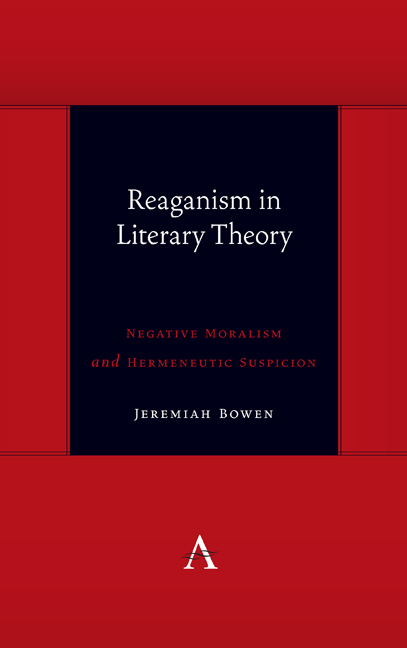Book contents
- Frontmatter
- Contents
- Acknowledgments
- Essay One Interpretive Politics: Reading Systemic Oppressions with Eve Sedgwick, Stephen Best and Sharon Marcus
- Essay Two Devotional Scholarship: Reading Academic Reaganism with Edward Said, Stanley Fish and Walter Jackson Bate
- Essay Three Negative Moralism: Reading Literariness, Materiality and Revolution with Paul de Man and J. Hillis Miller
- Index
Essay Two - Devotional Scholarship: Reading Academic Reaganism with Edward Said, Stanley Fish and Walter Jackson Bate
Published online by Cambridge University Press: 21 July 2020
- Frontmatter
- Contents
- Acknowledgments
- Essay One Interpretive Politics: Reading Systemic Oppressions with Eve Sedgwick, Stephen Best and Sharon Marcus
- Essay Two Devotional Scholarship: Reading Academic Reaganism with Edward Said, Stanley Fish and Walter Jackson Bate
- Essay Three Negative Moralism: Reading Literariness, Materiality and Revolution with Paul de Man and J. Hillis Miller
- Index
Summary
Ronald Reagan spoke often of a shining city on a hill, an image he ultimately borrowed from the Sermon on the Mount. Jesus also uses the image to evoke an exemplary community, but the example that community sets is diametrically opposed to what it signifies in Reagan's speeches. While Reagan describes the city in terms of pride, power and wealth, Jesus describes an example of meekness, mercy and peacemaking. Exhorting his disciples in the face of inevitable persecution by the global superpower Rome, Jesus charges them to be “the light of the world,” a beacon and example to the marginalized. Knowing they will be a disempowered minority, attacked and slandered by religious leaders and experts, he charges his disciples to ensure that “your righteousness shall exceed the righteousness of the scribes and Pharisees.” They should avoid every appearance of evil, as Paul would later advise, and when asked for their cloaks, they should also give their shirts. They should not limit their love to friends, but also extend it to enemies. They should offer forgiveness to those who harm them, and even invite them to do so again. If they are surpassingly humble, loving and generous in this way, Jesus assures them, no false witness or persecution can block out the light of their collective example, just as “a city that is set on a hill cannot be hid.”
Reagan's use of the image also disagrees with his more proximate source, John Winthrop's sermon on the docks, which fits Jesus's lessons to the new audience of Puritans about to embark for Massachusetts. Exhorting them to be “A Model of Christian Charity” in the New World, he reminds his fellow Nonconformist migrants that many would be watching their experiment, and so they must serve as an example of righteousness, as the early Christians did before them: “For we must consider that we shall be as a city upon a hill. The eyes of all people are upon us.” Much of Winthrop's advice is centered on political economy, in explanations of God's purposes in creating the wealthy and the poor, and specific instructions about giving charity and lending. Putting great emphasis on all Christians’ responsibility to love and provide for others as for themselves, Winthrop takes pains to specify that the rich are given charge of their wealth by and for God's purposes, and this commits them to help the poor.
- Type
- Chapter
- Information
- Reaganism in Literary TheoryNegative Moralism and Hermeneutic Suspicion, pp. 75 - 136Publisher: Anthem PressPrint publication year: 2020



